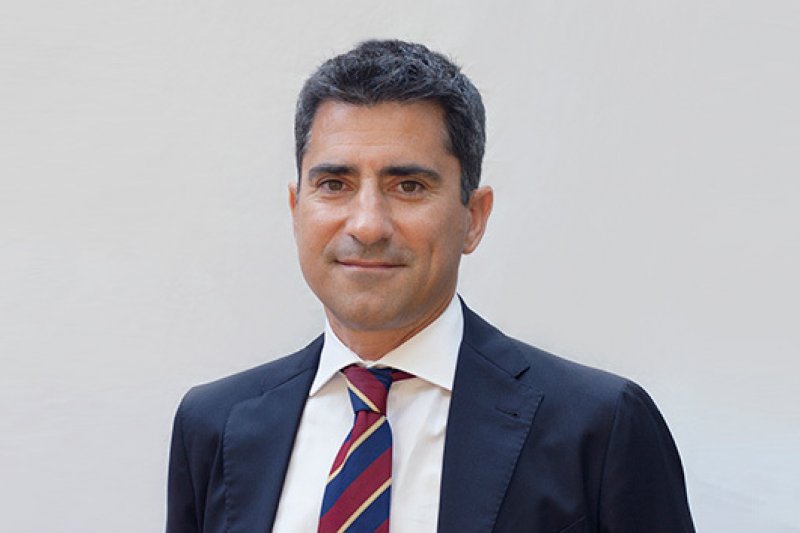Region’s Economic Recovery Underway
The contribution of the European Bank for Reconstruction and Development (EBRD) has been effective in helping the Western Balkans weather the impact of the pandemic crisis and lay the foundations for rebuilding better during the recovery phase, has said Matteo Colangeli, the new Director of the EBRD for the Western Balkans region.
In an exclusive interview with Albanian Daily News, Director Colangeli stressed that the economic recovery is already under way in the Western Balkans, and according to him, the crisis should be used as an opportunity for rebuilding greener, more inclusive and digitalized economies.
He highlighted three areas to which EBRD is very much committed to play a big role in the region: the green economy transition, sustainable tourism and agriculture, and the circular economy.
Mr. Matteo Colangeli, who will oversee the EBRD’s operations in Albania, Bosnia and Herzegovina, Kosovo, Montenegro, North Macedonia and Serbia, said, “Our investments are always aligned to strategic priorities for each of the countries, which broadly support the development of more sustainable economies that can deliver opportunities and raise living standards for the citizens of this region.â€
An Italian national, Mr. Colangeli joined the EBRD in 2005 as a banker in London. He went on to regional banker roles in Ukraine and Bulgaria, especially in the field of energy, before being appointed Head of Albania in 2016. Mr. Colangeli holds a master’s degree from the London School of Economics and Political Science. Starting on 17 May 2021, Mr. Colangeli succeeded Zsuzsanna Hargitai, who was appointed EBRD Managing Director, Central Asia.
Asked about how much is the EBRD contribution helping to promote and expedite the process of the EU integration of the Western Balkans countries, the Director said: “We are committed to support the EU approximation path of the region. This is reflected not only in our investments, for example to implement the connectivity agenda, but also in the policy and technical assistance support that we provide to the authorities in areas which are of key importance to convergence towards EU standards.â€
In his comment on the work done in Albania by EBRD while he was its top banker in that WB country over the last five years, Mr. Colangeli expressed satisfaction about what had been achieved and among others he mentioned that EBRD had significantly stepped up its investment volume in the country, supported landmark infrastructure projects like TAP and strengthened its support to the private sector, particularly by risk sharing with commercial banks. “We are also particularly proud of the role played in developing the solar power sector in Albania with the auctions for the Karavasta and Spitalla projects which attracted quality foreign investment and delivered highly competitive prices for Albania’s energy consumers. We look forward also to the first auction for wind power to be launched soon with our support.â€
But he had some suggestions with regard to the ‘weak points of the Albanian economy’. So, according to him, as a small country, Albania needs to integrate more in regional and global value chains and reducing informality, addressing the property rights issue and narrowing the skills gap remain key challenges.
Speaking of the post-Covid era globally, in his view the challenges to be faced in terms of environment, social inclusion and digitalization require coordinated responses across national boundaries. “EBRD will continue to work to find multilateral solutions to these challenges for the benefit of our countries of operations,†said the new EBRD Director for Western Balkans, Matteo Colangeli in the following interview:
Albanian Daily News: Mr. Matteo Colangeli as it is the first interview with ADN after your appointment as the new Director for the Western Balkans region and Head of Serbia for the European Bank for Reconstruction and Development (EBRD), please, let us congratulate you on this occasion. Hopefully like other parts of the world the Western Balkans will enter the post Covid era. Mr. Director, does your Office have a plan on how to help the regional countries to cope with the aftermath of this health multidimensional crisis? And secondly, which will be your priorities seeing the impact of the crisis in the region?
EBRD’s Director for WB Matteo Colangeli: The economic recovery is already under way in the Western Balkans. The crisis should be used as an opportunity for rebuilding greener, more inclusive and digitalized economies. We are very much committed to play a big role in these three areas. The green economy transition, in particular, should be accelerated, not only to deliver better environmental and living standards to the citizens of the region, but also to strengthen its economic competitiveness. This is especially relevant in terms of stepping up the ambitions and implementation of decarbonization strategies in countries that still rely heavily on fossil fuels.
The availability of green sources of power will become an increasingly important factor for investors when deciding where to locate manufacturing facilities, also for the implications this could have in terms of maintaining favorable access to the EU market. Sustainable tourism and agriculture are also sectors where the Western Balkans countries can be competitive if supported by the right policies and infrastructure development, including on a regional level. And lastly the circular economy, which remains largely underdeveloped in the region, will be increasingly in focus for our activities.
- Last year alone, the EBRD invested 1.3 billion euros in the Western Balkans with the focus on the strengthening of the private sector, the promotion of green transition and on boosting connectivity within the region and with European neighbors. Sir, have the projects invested by the Bank delivered, and please which is the way and to what extent do you check the efficient use of the investments?
- A big focus of our work last year has been on supporting the resilience of the Western Balkans economies to the Covid crisis. We provided liquidity to companies directly and through credit facilities and risk sharing with local banks. We also paid particular attention to the State- owned utilities that provide vital services, such as energy and water, to support their cash flow and financial stability. I think our contribution has been effective in helping the region weather the impact of the crisis, and lay foundations for rebuilding better during the recovery phase.
- Being a close watcher of EBRD’s activity, I have noticed that in Albania and other countries you have concluded many agreements. According to your estimations, has such a practice been rentable. I mean is the money well used to the benefit of the wellbeing of the people and development of the regional countries?
- Our investments are always aligned to strategic priorities for each of the countries, which broadly support the development of more sustainable economies that can deliver opportunities and raise living standards for the citizens of this region. We are strong advocates of good governance and financial transparency, and always aim to maximize these aspects in all the projects where we are involved.
- As a follow up, how much is EBRD’s contribution helping to promote and expedite the process of the EU integration of the Western Balkans countries, and could you please reveal which countries have been more efficient to profit from the Bank?
- We are committed to supporting the EU approximation path of the region. This is reflected not only in our investments, for example to implement the connectivity agenda, but also in the policy and technical assistance support that we provide to the authorities in areas which are of key importance to convergence towards EU standards. The work we are doing on helping countries developing and implementing their decarbonization strategies or our initiatives on investment climate and governance are important examples. Our engagement obviously varies in each of the countries based on specific needs as well as the role played by the EU, bilateral donors and other IFIs, with which we closely coordinate.
- Given the fact that you were a top banker of EBRD in Albania, please could you share with us a balance sheet of the cooperation of the Bank with this country and are you satisfied with the results achieved. Moreover, do they meet your expectations?
- We are certainly satisfied with the work done in Albania over the last five years. We have significantly stepped up our investment volume in the country, supporting landmark infrastructure projects like TAP and strengthening our support to the private sector, particularly by risk sharing with commercial banks. We are also particularly proud of the role played in developing the solar power sector in Albania with the auctions for the Karavasta and Spitalla projects which attracted quality foreign investment and delivered highly competitive prices for Albania’s energy consumers. We look forward also to the first auction for wind power to be launched soon with our support.
- Seeing the other side of the coin. Which are, according to you, the weak points of the Albanian economy and how can they be overcome? I want to be concrete. Which has been your stance on the controversial issue of Public-Private Partnership (PPP), widely undertaken by the Albanian government.
- As a small economy, Albania needs to integrate more in regional and global value chains. Reducing informality, addressing the property rights issue and narrowing the skills gap remain key challenges. As to PPPs, these can be useful financing structures to mobilize private investment. It is important for the authorities to invest the required resources and time to prepare these processes properly and monitor their performance during implementation.
- A top banker observes and makes assessments of the political situation of any place where they invest. In this frame what could you, Sir, say on the current situation in the Western Balkans when besides others much is spoken about the border exchanges and most of the leaders of the relevant countries see and speak out of eventual threats to peace and security in the region?
- Our work aims to contribute to greater economic integration in the region, creating the conditions for sustainable development and opportunities for its citizens. A more interconnected region progressing on its path towards EU approximation will continue to be an important factor for stability.
- To conclude, what can you say about the post-Covid era in the world and I mean will there be a shift of balance of power and what will be the role of the EBRD in the new situation?
- The challenges we face in terms of environment, social inclusion and digitalization require coordinated responses across national boundaries. EBRD will continue to work to find multilateral solutions to these challenges for the benefit of our countries of operations.














